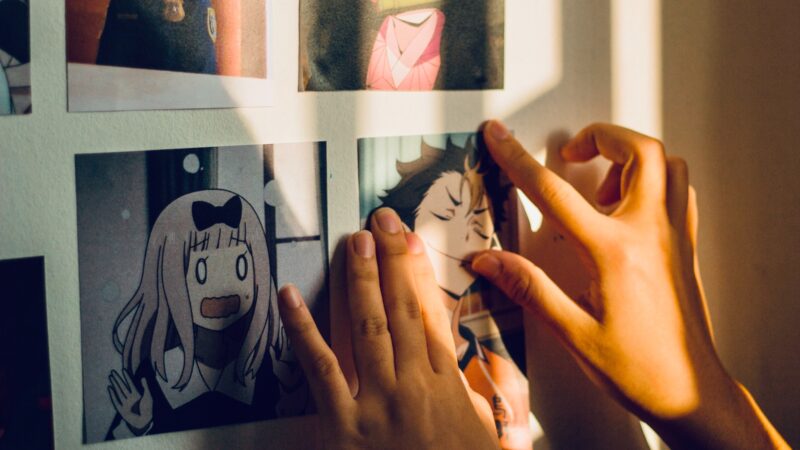A Romantic Case for Anime
We’ve all felt it—the mixed excitement and dread at hearing a beloved book is set to be made into a movie. They might do it right, capturing not only key plot events but also (and more importantly) how it feels to be swept up in the work as a whole; 2020’s Emma with Anya Taylor-Joy comes to my mind, most of all for the way it captures how someone who understands and loves Austen’s ubiquitous irony might feel when reading her work. However, they also might do it poorly; despite both 1974 and 2013 attempts’ being worth watching, I’ve yet to see a rendition of The Great Gatsby that captures the book’s plot and narrative tone in the right proportion (in my opinion, the 1974 version emphasizes the former but misses some of the latter, while parts of the 2013 version exagerrate the latter just to the border of parody). My readers have, no doubt, already imagined examples of works they’ve always wished could be faithfully put onto the screen and others they’d rather not be risked to the vicissitudes of translating from one medium to another.
The last decade has thankfully seen a growth in long-form, box-office quality productions that makes it more possible than ever to imagine longer works being produced without curtailing their lengthy plotlines—example, the BBC’s 2016 rendition of War and Peace. However, this leaves another, perhaps more important, hurdle to hazard: while live-action media can now faithfully follow the plots of the originals, there still remains the difficulty of conveying the tone and feel of the works, especially when different media necessarily have different capacities and limitations of representation. Though I’ve enjoyed productions that have been made, I don’t know that I would expect live-action renditions to reproduce the aesthetic impression of, say, Paradise Lost, The Hunchback of Notre Dame, or Crime and Punishment, and I worry that attempts to do so might mar more than measure up. The problem lies in the difficulty of translating characters’ inner experience—which is usually conveyed by a stylizing narrator—via the essentially externalistic medium of the camera eye.
While a live action movie or series might remain faithful to the selective events in a plot, the lack of an interpretive narrator removes a key element of what defines epic poems and novels. Paradoxically, the narrowing of perspective through a stylizing narrator allows story to move from the limits of natural events into the limitlessness of human perception and interpretation. Voiceover narrators can provide thematic stylization in film, as well as essential plot coherence, but it is still primarily the camera that replaces the literary narrator as the means of conveyance. Furthermore, if too ubiquitous, voiceovers can separate the audience from the action, which is the focus of film. Film’s power inheres in its ability to place the audience in the midst of a plot, removing as many frames between the watcher and the story’s events as possible. However, this is also why books are so difficult to translate: motion pictures focus on events when the aesthetic experience of literature inheres in how characters and narrator experience said events.
The literary movement that focused most on the character’s experience (and, vicariously, ours) as the purpose of art was Romanticism. Romantic literature and poetry were less concerned about the subject matter than about their effect on the character’s emotions—in the sense that, from the generally Platonic metaphysics of the Romantics, the incidental reaches its fullest meaning by provoking an aesthetic experience far beyond it. From Hawthorne’s rose bush growing outside Salem’s prison, to Shelley’s secondhand rumination on the ruined feet of Ozymandias, to Keats’s apostrophe to the Grecian urn, the Romantics showed how part of the reality of an object involves its significance to the observer, and it was the role of the Romantic narrator and speaker to draw out that effect for the reader.
It is this essential influence of the narrator and characters’ inner lives on the great works’ aesthetic experience that makes me skeptical of even the best acting, camera work, and post-production effects to sufficiently replace them. It may be possible, and, again, I have very much enjoyed some renditions. Furthermore, not wanting to be the audience member who misses the Shakespeare performance for the open copy of the play on their lap, I tend to watch movie adaptations as distinct works rather than in strict relation to the originals. However, this, itself, may be a concession to my hesitance to trust film to live up to the aesthetic experience of certain books. I would, however, trust anime to do so.
While a history of Japanese manga and anime is beyond the scope of this piece (or my expertise), since choosing to explore the artform as a post-grad-school reward (or recovery—one can only stare at the sun that is Paradise Lost for so long) I’ve watched plenty of anime over the past ten years, and I have become convinced that it might serve as, at least, a middle ground when seeking to capture plot, narrative tone, and inner character experience in a motion medium. Anime is capable of handling virtually every story genre, and while it contains many of the same ridiculous hi-jinks and satire of Western cartoons and CG animation, it can also capture tragic pathos and sublime catharsis in ways that would be out of place in the vast majority of Western animation. This makes sense: originating in early 20th-century Japan, manga and anime were not subject to the same skepticism about artistic representations of transcendent value that characterized Western art after the move from 19th-century Romanticism and Realism to 20th-century modernism and post-modernism.
Of course, there have been exceptions; 20th-century Disney animation, or Marvel and DC Comics, were iconic because they attempted to be iconic—they unironically tried to depict in images those values and stories that are transcendent. However, even these were created predominantly with the child (or the childlike adult) in mind. Furthermore, while anime certainly has deserved elements of ambivalence, if not cynicism, and while there are many incredibly satirical and humorous series, anime as an artform is not implicitly dismissive of narrative trustworthiness and characters’ experience of the transcendent in the same way that much of Western motion art is. Rather, anime conventionally allows for the sublime heights and deepest horrors that previously characterized Romanticism, all of which it presents through the stylization of animation. This stylization is able to act as an interpretive medium just like a novel’s narrator, contextualizing events through the experience of those involved in a way often eschewed by, if not unavailable to, film.
For an example, I submit Kaguya-sama: Love is War (Japanese Kaguya-sama wa Kokurasetai – Tensai-tachi no Ren’ai Zunōsen, “Kaguya Wants to Make Them Confess: The Geniuses’ War of Hearts and Minds”). Though a romantic comedy in the Slice-of-Life genre, it exemplifies anime’s ability to convey the heights and depths of inner experience of the characters—here Kaguya and Miyuki, a pair of high school teenagers who, as student council president and vice president, compete to be top of their class while being secretly in love with each other and too proud to admit it. As the English title conveys, a running metaphor through the show is the bellicose subtext of their attempts to maneuver each other into confessing their love first and, thus, losing the war; think Beatrice and Benedick with the extremizing effect of teenage hormones and motifs of heavy artillery.
Plot-wise, Love is War follows a standard rom-com formula, with tropes recognizable to Western audiences: the pride and prejudices of the characters, the much ado about things that end up being really nothing, the presence of a mutual friend who acts as an oblivious catalist and go-between in the relationship, etc. However, the show reinvigorates these tropes by portraying via hyperbolic narrator the deuteragonists’ experience of the episodes’ conflicts, bringing audience members into the all-consuming tension of how a teenager might see something as minor as whether to share an item from their lunch. The combination of chess and military metaphors conveys the inner conflicts of the initially cold but gradually warming characters (the “tsundere” character type common in such animes), and the consistency of such motifs creates a unified aesthetic that, due in large part to the disconnect between the over-the-top tone and, in reality, low-stakes subject matter, is hysterical. Another unique aspect about Love is War is that, due to its focus on the characters’ experience of the plot (all the better for being trivially mundane), it’s a technically Romantic romantic comedy.
Love is War is, of course, a low-stakes example of what modern anime can do, though it did score three awards, including Best Comedy, at the 2020 Crunchyroll Anime Awards. A more serious example, Death Note, similarly conveys much of its gravitas through voiceover—this time the first-person narration of protagonist Light Yagami, a high schooler who with the help of a book from the realm of the dead is able to kill anyone whose name and face he knows, and L, a mysterious and reclusive detective charged by Interpol to find him. Throughout the series—which employs similar, if non-parodic, attempts by characters to outwit each other as Love is War—Light and L articulate their planned maneuvers and the implications thereof through inner voiceover. Not only does the narration lay out elements of their battle of wits that the audience might have missed, but it conveys the growing tension the two experience—especially Light, who, as he amasses fame as both a menace and cult hero experiences a growing egotism and subsequent paranoia around the possibility of being found out.
Just as Love is War is, in many ways, a parallel of Pride and Prejudice (Elizabeth and Darcy, themselves, both being tsundere characters), Death Note’s focus on a young man who wishes to achieve greatness by killing those deserving of death and who subsequently develops a maddening neurosis is virtually the same as Crime and Punishment—however enormously their plots and endings differ (Crime and Punishment lacks an explicit demonic presence like Death Note’s Shinigami Ryuk, the Death Note’s otherworldly owner; Dostoevsky would not employ the spectre of a conversant devil until The Brothers Karamazov—yet another point of consanguinity between anime like Death Note and his writing). Regardless of their differing plots, the anime’s inclusion of the characters’ inner thoughts and imaginations convey an increasingly tense tone similar to how Dostoevsky steadily shows Raskalnikov’s moral unmooring, and the explanations and attempted self-justifications by both Light and L convey more than I think even the best cinema would be capable of showing.
I am not advocating that every narrative motif or figuration be included in page-to-screen renditions, nor that we cease trying to actively reinvigorate great works of art through judicious adaptations into new media. Yet, if the inner lives of teenagers—which are often exaggerated, if at times unnecessarily, to Romantic proportions—can be portrayed by anime to such comic and tragic effect, with the figuration and tone of the characters’ perceptions seamlessly paralleling the literal events without obscuring them, then I’d be interested to see what an anime Jane Eyre, The Alchemist, or Sula might look like. Based on the above examples, as well as anime heavyweights like Fullmetal Alchemist, Cowboy Bebop, and, if one is not faint of heart, Berserk, all of which present events in some measure through the background and perspective of the main characters, I could imagine the works of Milton, Hugo, Austen, Dostoevsky, and others in anime form, with the aesthetic experience of the original narration intact.





Cycling Around Japan
In early 2023, I began watching NHK (Japan’s state broadcaster, akin to the BBC) and discovered a breath of fresh air. A news channel that tells the news in English and has no weird politics or stances it pushes onto you. It was from this, that I noticed that a lot of their programs were different documentaries, mostly which were short that depicted various aspects of the nation’s culture and history. These often ranged from showcasing different cuisines to local history and sports from across Japan. It was from this, that I ended up on a show called ‘Cycling around Japan’, a simple show I must admit of individuals as the name would suggest, that cycle around Japan. A typical episode can be found here.
Its format is simple: follow a non-native individual on a bike around Japan, watching them interact with and appreciate the different locations across the country. As someone who has never been to Japan, nor bikes, why should I be drawn to such programming especially as it is something that would not attract an individual like myself? To understand that question, we must first look closer to home as to why I do not watch my country’s state broadcaster.
Although criticism of the BBC has always really existed, it has become heightened in the last twenty years regarding the content it produces and its lack of impartiality. What the BBC typically used to do well in was its long-form documentaries, we can think of these being narrated by individuals like David Attenborough. Additionally, there are also short formatted programs that showcase the beauty and appreciation for the country we call home. From this great catalog of work, we now look at the BBC and its programs. A recurring trend we have seen emerge is that of the widespread self-hatred that makes up the BBC and often its presenting class. In recent years numerous programming and shows have been produced on the failings and detractions of Great Britain and the British people. Of course, the BBC still does produce great work and shows for all, but the rest of the time it suffers from an oikophobic disease which is particular to the modern West. But NHK does not have/ hold this problem, the programming is largely these very respectful documentaries that promote Japan and its people.
The real question should be this, why does NHK work and the BBC receive widespread criticism? Well, I would argue it is because of shows like Cycling Around Japan, which we can contrast with other shows. How many times have you watched a show or a piece of media from the BBC, which has either been presented by someone who does not like the country they call home or completely misrepresents the nation as a whole? There is no Afua Hirsch, no David Olusoga and no Kehinde Andrews. I would argue this is part of a wider historical trend of showing only one side of a story, portraying the West/Europe in an ultimately negative light.
So why is Cycling around Japan different?
Firstly, this is common across all NHK shows. Nearly all the presenters have a deep love and interest in Japan, the subject matter they are dealing with. Moreover, all the non-Japanese who do the cycling speak fluent Japanese, having lived in the country for a decade-plus, possessing an already basic level of respect and appreciation for the culture they are traveling through and exploring. There are times when BBC presenters are not too interested in presenting Britain at all, opting to address their subjects at an arms-length with a slight hint of embarrassment. NHK does the complete opposite.
A show like Cycling Around Japan, works due to its simplicity and its appeal to traditional life, which for many makes the country a place of envy. From meeting furniture makers and sake brewers, we are constantly seeing and interacting with individuals dedicated to the perfection of their craft. It is this focus and interest in a wide range of activities all across the country, that creates this understanding and love of the little things in life. Combined with the added interest in beautiful scenery, clean peaceful streets, and rich history, we cannot help but fall in love with such a nation. A wholesome slice of life shown to us through the eyes of an English-speaking, non-Japanese person who throws themselves into every interaction and encounter.
This is partly why NHK works and the BBC does not; its state broadcaster has lost this love and appreciation for the country it calls home and subsequently cannot produce anything like this of substance. What we can observe is something rather achievable, a national broadcaster that produces simplistic but enjoyable content that is not self-loathing. Indeed, content can be as simple as allowing a non-native to cycle around the country, meeting and learning about the nation as they go, and make for an excellent watching experience. Meeting artisans, farmers, and musical instrument makers, we are presented with a truer reflection of the country and its many inhabitants.
Photo Credit.